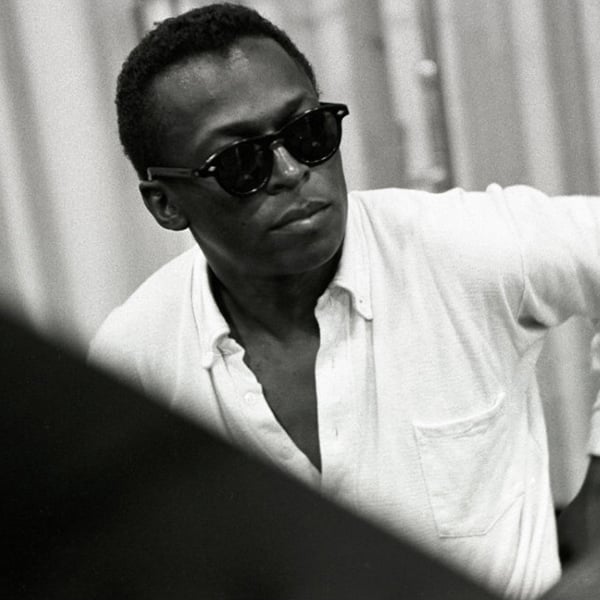
Recorded in March 1961 but not released until December that year, this studio album was the switch back to a small-group effort following the big-band project Sketches of Spain. It featured a balance of standards and new originals, all named for people in Miles’ life at the time), with hardbop tenorman Hank Mobley new to the lineup, adding his tone and bebop feel to the mix (or not, like on “Teo,” titled with the name of producer Teo Macero, with its sly, Latin vibe and his old sideman John Coltrane on tenor, sculpting a smoldering solo.)
Like the live album released before it, Someday reveals Miles’ affection for his wife; the title itself seems a statement on their union. She’s again prominent on the cover, eyebrows raised, bold and composed. She has another song dedicated to her—the snappy, back-and-forth themed “Pfrancing” (aka “No Blues”)—and other tracks share a similar loose-limbed, jaunty feel. There are sentimental, more introverted tracks as well: “Drad Dog” (referencing Columbia Records president Goddard Lieberson—his first name spelled backwards— and re-employing the chords and muted mood of “Blue In Green”), “Old Folks” (featuring Mobley feeling his way through a stellar improvisation with his deep-in-the-bell tone), and “I Thought About You.”
The title track is the standout of the album, a hip, updated take on the wide-eyed love song from Walt Disney’s 1937 classic Snow White and the Seven Dwarfs that plays off the implied tension of innocence and sultry experience. The opening vamp defined by Chambers’s throbbing bass and Cobb’s cymbal bell amps up the tension until just the right moment, releasing into waltz time as Miles blows the theme with both delicacy and sly suggestion. It’s a standout moment in his Columbia catalogue, and his ensuing solo is a lyrical and rhythmically masterful; “sweet and sour” Ira Gitler called it in the original liner notes. That the track also includes improvisations by Mobley and Coltrane—one mellow and loose, the other intense and cerebral—makes it one of those historic encounters that could only happen once, and in fact, it never occurred again.
There was one other last reunion that took place during the sessions for Someday: on the originally unissued track “Blues No. 2” drummer Philly Joe Jones hits with his familiar crispness and “conversation”—all skips and flourishes—a bittersweet reminder of their years together.





